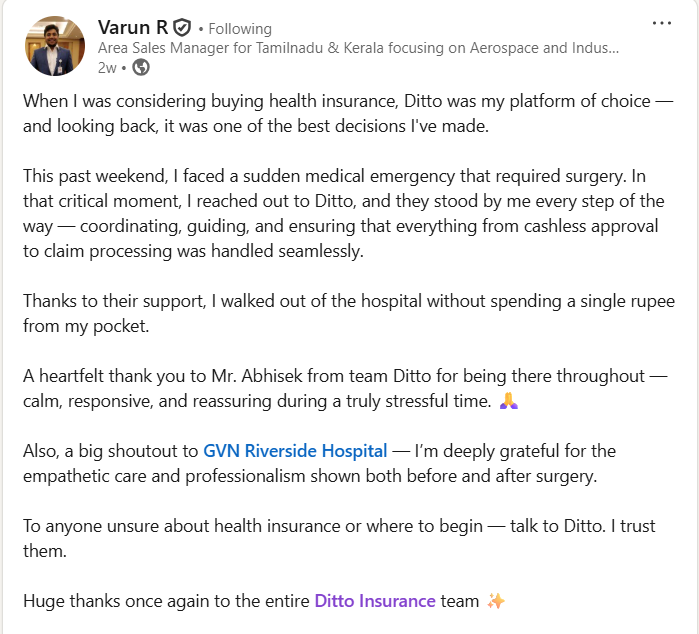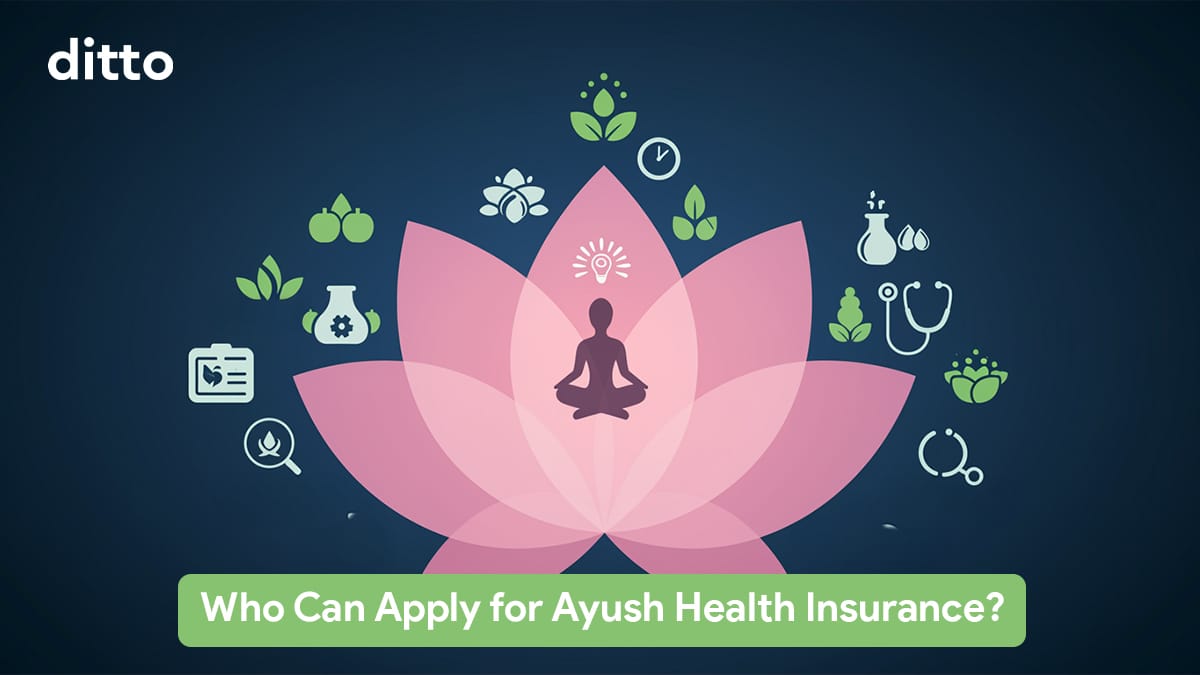| What is Ayush Health Insurance? AYUSH Health Insurance provides coverage for treatments under Ayurveda, Yoga, Naturopathy, Unani, Siddha, and Homeopathy. As per IRDAI’s 2024 mandate, all health insurers must treat AYUSH coverage at par with allopathic medicine. However, benefits can only be claimed if the AYUSH health insurance eligibility criteria are met. This includes a minimum of 24 hours of inpatient-hospitalization, treatment at a government-recognized or NABH/NABL-accredited AYUSH hospital, at least five inpatient beds, and a qualified AYUSH practitioner supervising the therapy. |
According to MoSPI’s AYUSH Survey of 2022-2023, AYUSH therapies are gaining widespread acceptance, with around 46% of rural Indians and 53% of urban Indians using them for prevention or treatment. Recognizing this growing preference, the IRDAI has updated its guidelines, and policyholders can now claim AYUSH expenses under standard health insurance.
But here’s the catch: not every wellness retreat or yoga camp qualifies.
To ensure claims are honoured, treatments must be taken at recognized facilities with proper infrastructure and documentation. In this guide, we’ll break down the exact AYUSH Health Insurance eligibility requirements so you know how to make the most of your cover in 2025.
Not sure if your AYUSH hospital is covered? Book a free call with Ditto’s advisors - we’ll verify your eligibility and help you pick the right policy.
Eligibility Criteria of Ayush Health Insurance
Let’s break down the key requirements according to IRDAI’s master circular on standardization of Health Insurance products.
1) Minimum Hospitalization Period:
The treatment must involve hospitalization for more than 24 hours.
2) Recognized Treatment Facility:
The treatment must take place in one of the following:
- A Central or State Government-recognized AYUSH hospital
- A facility accredited by the National Accreditation Board for Hospitals (NABH) or the National Accreditation Board for Testing and Calibration Laboratories (NABL).
3) Hospital Infrastructure Requirements:
The AYUSH hospital or center must have:
- At least 5 inpatient beds
- A qualified AYUSH practitioner is overseeing the treatment
- Daily maintained treatment records, available for review during claim processing
These criteria ensure that the AYUSH treatment is conducted in a regulated, professional environment, improving both treatment outcomes and claim transparency.
| Did you know? The Ministry of AYUSH was originally a department under the Ministry of Health & Family Welfare in 1995, renamed in 2003, and finally elevated to a full-fledged ministry in 2014. It oversees the promotion, research, education, and integration of traditional medicine systems like Ayurveda, Yoga, Unani, Siddha, and Homeopathy in India’s healthcare ecosystem. In December 2023, the Madurai Bench of the Madras High Court directed the IRDAI to treat AYUSH treatment reimbursements at par with allopathic treatments, a landmark judgment that paved the way for stronger regulatory enforcement. |
Reasons to Select a Health Insurance Policy with AYUSH Cover
With the increasing popularity of traditional and holistic healing methods in India, AYUSH treatments have emerged as a preferred alternative or complement to allopathic medicine for many individuals. Choosing a health insurance policy that includes AYUSH cover offers several key advantages:
1) Holistic and Personalized Care
AYUSH systems such as Ayurveda, Homeopathy, and Naturopathy emphasize individualized, root-cause-focused treatments. Many policyholders seek these options for chronic conditions, lifestyle issues, and preventive wellness, making health coverage for them more relevant than ever.
2) Regulatory Backing by IRDAI
Since IRDAI backs AYUSH coverage, it ensures policyholders get equal protection and access, whether they choose modern or traditional treatment paths.
3) Cashless Treatment at Accredited AYUSH Hospitals
Under the latest guidelines, insurers are required to build cashless networks for AYUSH hospitals, just like they do for allopathic hospitals. This removes the burden of upfront payments and simplifies the claims process.
4) Coverage Across a Broad Range of Ailments
From stress-related conditions to digestive disorders and chronic pain, AYUSH therapies are increasingly used to treat non-emergency yet persistent health issues. Having insurance that covers these treatments means you can explore them without financial strain.
5) Stronger Oversight and Quality Standards
IRDAI now requires insurers to:
- Define board-approved policies for AYUSH coverage
- Establish standard operating procedures for evaluating claims
- Collaborate with the Ministry of AYUSH’s Core Group of Experts
This framework helps ensure transparency, reduces fraudulent claims, and improves the quality of AYUSH insurance.
| A Quick Claim Story One of our customers had taken the Care Supreme policy for himself, his wife, and two daughters in June 2024. Both daughters had myopia (declared at the time of purchase) and were undergoing yearly AYUSH treatment for it. In April 2025, they were hospitalized at a non-network AYUSH hospital, and a reimbursement claim was filed. Surprisingly, the insurer denied the claim, citing a waiting period for pre-existing conditions. But since myopia was already declared and accepted without a waiting period during underwriting, we stepped in. We escalated the matter, arguing that it was the insurer’s responsibility to ask for more details or trigger medical underwriting if needed. The insurer acknowledged the oversight and approved both claims of ₹54,000 each. It was a good reminder that clear disclosure and persistent follow-up can go a long way. PS. If you need claim assistance, feel free to reach out to us. |
Ditto’s Take on AYUSH Health Insurance
While AYUSH coverage in health insurance is a step in the right direction, there are still a few practical and regulatory realities that policyholders should be aware of.
Insurers treat AYUSH claims just like other allopathic ones as long as hospitalisation is medically necessary and the treatment is administered at a certified facility.
However, many AYUSH claims still face hurdles because:
- There’s a lack of standardized treatment protocols across AYUSH disciplines.
- Clinical validation and outcome-based research are still evolving.
- Documentation requirements can vary across AYUSH centers.
- Most AYUSH treatments are processed as reimbursement claims, since many government-certified AYUSH hospitals are not part of insurers' cashless networks.
While IRDAI’s regulatory push has improved access, there are still a few critical caveats and exclusions to be aware of.
Exclusions and Limitations to Keep in Mind
- Day care treatments and pre- and post-hospitalisation coverage may not be available under AYUSH.
- Treatments at uncertified or unaccredited centers (like non-NABH/NABL-certified clinics) aren’t covered.
- OPD visits or therapies offered at spas, wellness retreats, or yoga resorts are not eligible for claims.
- Some older or basic policies, such as Star Health Comprehensive, may cap AYUSH treatment expenses (e.g., up to 25% of the sum insured or ₹50,000). However, most newer plans now offer AYUSH coverage up to the full base sum insured.
- Cosmetic or experimental AYUSH procedures, even if done at certified centers, are typically excluded.
Full Disclosure: While most of the claims we handle are allopathic, we're still learning the ins and outs of AYUSH coverage as the space evolves. At Ditto, we recommend double-checking whether your preferred AYUSH center is certified and whether your condition meets the hospitalization criteria. If you're unsure, we’re always happy to help you review your policy or confirm claim eligibility.
Why Choose Ditto for Health Insurance
At Ditto, we’ve assisted over 7,00,000 customers with choosing the right insurance policy. Why customers like Varun below love us:

✅No-Spam & No Salesmen
✅Rated 4.9/5 on Google Reviews by 5,000+ happy customers
✅Backed by Zerodha
✅100% Free Consultation
You can book a FREE consultation. Slots are running out, so make sure you book a call now!
Conclusion
AYUSH health insurance is no longer an optional add-on. It’s now a standard benefit across all health plans. With the proper eligibility checks (certified hospitals, 24-hour admission, proper records), you can access holistic care without worrying about claim rejections.
That said, be mindful of exclusions like spa therapies, uncertified centres, or cosmetic procedures, which insurers won’t cover. If you’re unsure whether your preferred AYUSH hospital or treatment is included, speak to a Ditto advisor, and we’ll verify the fine print and help you pick the right policy.
FAQs
What is AYUSH health insurance?
It’s health coverage for treatments under Ayurveda, Yoga, Naturopathy, Unani, Siddha, and Homeopathy. Since April 2024, IRDAI has made AYUSH cover mandatory in all health insurance plans.
What is the eligibility for AYUSH health insurance?
To be eligible, you need:
- Hospitalization for 24+ hours
- Treatment at a recognized AYUSH hospital (Govt-recognized, NABH, or NABL accredited)
- Minimum 5 inpatient beds, qualified practitioners, and proper treatment records
Who all can get the benefits of AYUSH?
Any policyholder under an eligible health insurance plan can claim AYUSH benefits, provided treatment is taken at accredited facilities.
Is it possible to get AYUSH benefits under cashless claims?
Yes. Under new IRDAI guidelines, insurers must set up cashless AYUSH hospital networks, just like for allopathic hospitals.
Last updated on:










